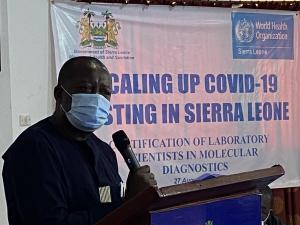WHO Demonstrates strategic commitment by supporting COVID-19 testing and laboratory capacity in Sierra Leone.
FREETOWN, 27 August, 2020 – The Ministry of Health and Sanitation in collaboration with the World Health Organization, has awarded certificates of participation to 30 laboratory scientists who were recruited and have undergone training in molecular diagnostics as one of the strategies to scale up COVID-19 testing in Sierra Leone. The 30 scientists are university graduates in basic sciences and were selected, based on competencies, to attend a short intensive theoretical and hands-on training in molecular diagnostics.
“We feel extremely proud as WHO to support the building of national capacity in molecular laboratory during this pandemic, and to improve testing for other epidemic prone diseases in the long run, as one of the means to strengthen the health system in Sierra Leone”, says Evans Liyosi, WHO Representative in Sierra Leone.
With the trained laboratory scientists that have been deployed to five COVID-19 testing laboratories across Sierra Leone, and the additional investment being made to equip and commission more testing centers in the country, testing capacity for COVID-19 and other diseases is set to increase significantly in the coming weeks.
“The laboratory sector has been very challenged over the years. From the Ebola epidemic to COVID-19 pandemic, laboratory capacity has consistently proven to be low. We are therefore pleased and grateful for the support that the WHO is providing to ensure improved laboratory capacity that goes beyond the COVID-19 pandemic”, say Prof. Sahr Gevao, Director of Laboratory Services in the Ministry of Health and Sanitation.
Currently, Sierra Leone’s COVID-19 testing capacity lies at approximately 400 samples a day. This is now set to increase to a targeted 1000 samples per day. At the same time the turnaround time, which is the time it takes to produce results after testing, is expected to improve considerably.
The WHO fully funded training and providing technical support by hiring two international consultants to facilitate the training and mentorship of these laboratory scientists; augmenting technical input from the Ministry of Health and Sanitation, and training schools. This support is in line with the national COVID-19 response strategic plan and seeks to fill existing gaps by building local capacities to expand COVID-19 testing capacity, which is one of the five key national strategies to achieve the response objectives.
“The training itself is a golden opportunity for our personal professional career development, but also to be able to serve our country in one of its most critical areas of need” says Marian Tarawally, one of the newly trained molecular lab scientists.
WHO will also fund the remuneration of the 30 laboratory scientists for a period of six months in order to facilitate a smooth transition to the government’s commitment to ensure the sustainability of this important national capacity of the health sector; ensuring access to quality health services for all.
Laboratory testing allows early detection of COVID-19 cases and is critical in effective control of the spread of the disease. Using molecular diagnostic platforms, approximately 26,000 tests have been carried out in Sierra Leone since the onset of the pandemic, with an overall positivity rate of 3.34 per 1000 population. Testing is currently being carried out in five molecular laboratories in the country including; Central Public Health Reference laboratory, Jui P3, Connaught National Teaching and Referral Hospital, 34 Military, and Kenema Government Hospital. Expansion of testing capacity through the setting up and commissioning of a molecular laboratory at the Makeni Government Hospital premises is in the final stages.
The laboratory scientists will also be actively involved in the laboratory surveillance of other epidemic prone diseases such as Ebola virus disease, Lassa fever, measles, yellow fever and Influenza among others.




